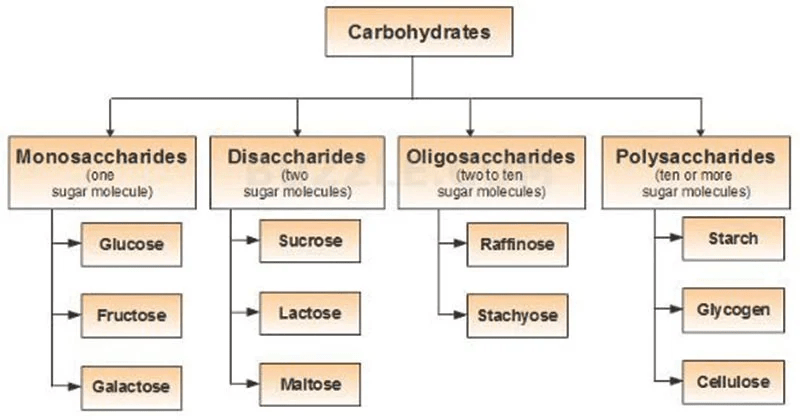Table of Contents
Carbohydrates: The Body’s Fuel Source
Carbohydrate are a fundamental class of organic compounds found in all living things. They play a vital role in our bodies as a primary source of energy and serve other important functions. Here’s a comprehensive look at their classification, functions, and the consequences of deficiency.

Classification of Carbohydrates
Carbohydrate can be classified based on their structure and complexity:

- Monosaccharides: The simplest sugars, or carbs, as they are commonly called. They are easily absorbed by the body for energy and have just one sugar unit. Examples include fructose (found in fruits), galactose (found in milk), and glucose (blood sugar).
- Disaccharides: Composed of two monosaccharide molecules joined by a link. For absorption, they must be broken down into single sugars by digestion. Table sugar sucrose, milk sugar lactose, and maltose (found in starchy foods) are a few examples.
- Polysaccharides: Complex carbohydrate are made up of several monosaccharide molecules connected by linkages. During digestion, they must be broken down further more into simpler sugars. As examples, consider:
- Starch: The primary storage form of carbohydrate in plants, found in grains, potatoes, and legumes.
- Glycogen: The storage form of carbohydrate in animals, mainly present in the liver and muscles.
- Fiber: A type of polysaccharide that cannot be completely digested by humans but plays a crucial role in gut health. Examples include cellulose (found in plant cell walls) and dietary fiber.
Functions of Carbohydrates
Carbohydrates serve several essential functions in the body:
- Energy Source: Carbohydrate are mostly used by our cells to produce energy. Glucose, which is produced when carbs are broken down, enters the bloodstream and powers several biological functions.
- Brain Function: Glucose is the main source of energy for the brain, playing a critical role in cognitive function, memory, and concentration.
- Muscle Function: Muscles need carbohydrate as fuel when they perform physical labour. Muscle-stored glycogen is easily accessible for brief energy spikes, whereas ingested carbs provide steady energy for extended physical activity.
- Fiber for Gut Health: Even though it is partially broken down, dietary fibre supports regularity, facilitates digestion, and feeds good gut flora, all of which improve gut health.
- Regulation: Some carbohydrate participate in regulating blood sugar levels and may influence hormone production.
Deficiency of Carbohydrates
While carbohydrates are essential, excessive consumption can lead to health problems like obesity and diabetes. However, a deficiency can also have detrimental effects:
- Low energy levels: Without adequate carbohydrate intake, the body struggles to maintain energy levels, leading to fatigue, weakness, and difficulty concentrating.
- Ketosis: In severe deficiency, the body starts breaking down fat for energy, producing ketones as a byproduct. This can cause unpleasant side effects like nausea, fatigue, and bad breath.
- Muscle breakdown: In prolonged deficiency, the body may break down muscle tissue for energy, leading to muscle weakness and wasting.
- Organ function: Carbohydrate play a role in some organ functions. A severe deficiency can impact the function of the liver, kidneys, and heart.
It’s crucial to remember that each person has different needs for carbohydrate depending on their age, degree of exercise, and general health. For optimum health, a balanced diet with a modest amount of complex carbs and a restricted intake of simple sugars is advised. Determining your individual requirements for carbohydrate can be aided by speaking with a healthcare provider.
Additional Points:
- Glycemic Index (GI): This index categorizes carbohydrate based on their impact on blood sugar levels. Low GI carbohydrates cause a slower rise in blood sugar compared to high GI carbohydrates.
- Fiber Intake: Adequate fiber intake is crucial for maintaining gut health and managing blood sugar levels. Aim for a variety of fruits, vegetables, and whole grains to increase fiber intake.
By understanding the classification, functions, and consequences of deficiency, you can make informed choices about including a balanced range of carbohydrates in your diet for optimal health and well-being.
Frequently Asked Questions (FAQs)
What are the classification and functions of carbohydrates?
They serve a variety of purposes, including supplying the cells with energy and maintaining the structural integrity of the cells as well as promoting the growth and development of the organism.
What are the deficiencies of carbohydrates?
A carbohydrate-deficient diet may cause headaches, fatigue, weakness, difficulty concentrating, nausea, constipation, bad breath and vitamin and mineral deficiencies.
What is the primary function of carbohydrates?
The major function of carbohydrates is to provide energy. The body uses glucose to provide most of the energy for the human brain.
Related Articles

